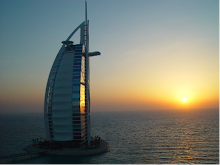Dubai World has now entered a new and very challenging market: Djibouti, a small East African country that boasts high rates of poverty, unemployment and a tortured and scared countryside. The nation has witnessed horrific suppression from cutthroat Somali military dictators from the neighboring war-torn nation of Somalia. It sits directly on the Southern tip of the Red Sea, with Yemen just a few miles across the busy straight separating Africa from the Middle Eastern peninsula. Not many individuals have ever heard of this small nation of under half a million inhabitants, but when Sultan Ahmed bin Sulayem, co-founder and chairman of Dubai World came witnessed its prime location and great economic potential, he made a move. Not many investors would make the plunge into a nation plagued with poverty and military and political uncertainty, but Dubaians see the greatest challenges and risks offering the largest potential economic return.
Sulayem looks at a large prehistoric, desolate salt lake over an hours drive from electricity and fresh water and envisions a luxury resort, complete with hotels and a golf course. He relates Djibouti to Dubai just 30 years ago; a city of sand, poverty and uncertainty. Many look to Sulayem as a genius venture capitalist, heading the operations of one of the fastest growing and most successful holding companies the world has ever witnessed. Others see him as a genuine bringer of good-will, and certainly good fortune, transforming cities once considered doomed and untouchable by the outside world into high class luxury centers of bustling commerce and tourism. His vision is unique, so say the least, and his ventures even more unprecedented, but the reality is that Dubai World has hit more than enough goldmines. He imagines that virtually any city, under any circumstances, has the potential for greatness, with a few billion dollars of investment capital of course.
Djibouti is just one of the latest examples of his venture and vision for rebuilding an entire city and transforming a nation's economy. This is just a snapshot of the current holdings and major investment projects underway by Dubai World:



No comments:
Post a Comment